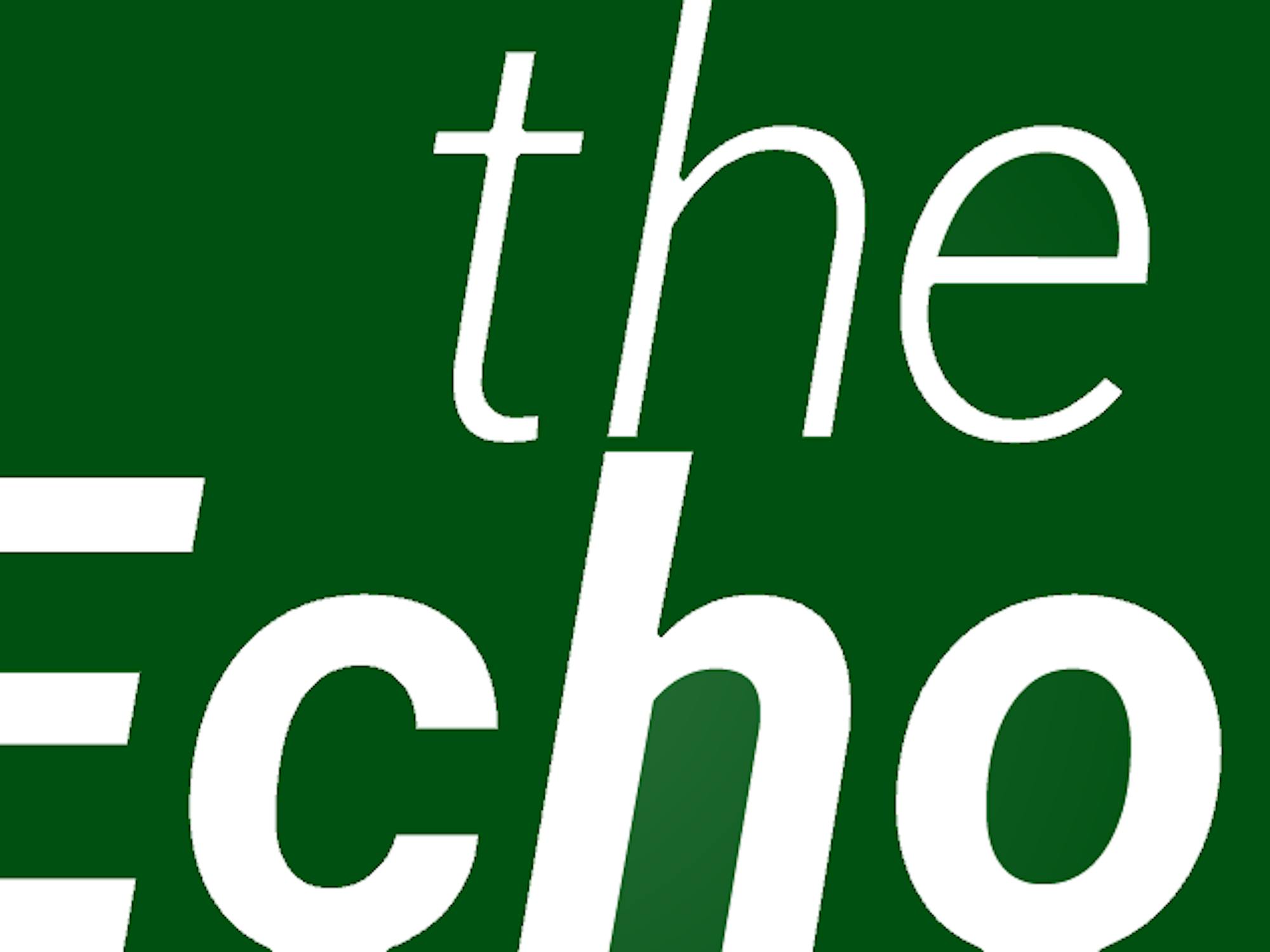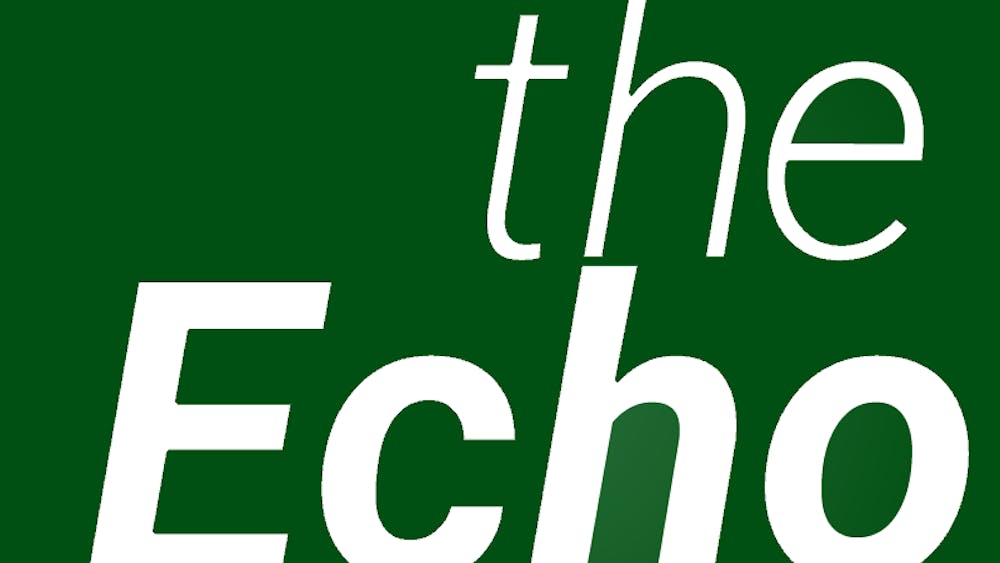Ronia-Isabel Cabansag: Homecoming celebrations are over and stress is in the air. Maybe you’ve skipped a class, a meal or several hours of sleep. Whether you’re a freshman or a senior, music ed. or pre-med, everyone can feel it because the last six weeks have been leading up to this very moment. Midterm season. Schoolwork and stress are unavoidable but The Echo team is here to remind you to take care of yourself this month.
In the next two weeks, we’ll be taking you through a short student wellness series. As you tune in for the next several minutes, take this moment to simply listen, breathe and be. Today, we’ll introduce some mental wellness resources available to you both on and off campus from group therapy to lakefront meditation.
I’m Ronia-Isabel Cabansag and you’re listening to the Eastern Echo Podcast.
One of the most prominent mental health resources on campus is the one-on-one counseling available through EMU’s Counseling and Psychological Services center or CAPS. Most students are pretty familiar with the service. Any student can receive one-on-one counseling with a licensed therapist, free of charge, up to twelve times during the year. Students can expect their first appointment to take about 90 minutes - that’s 30 for paperwork plus 1 hour with a therapist. After that, the typical schedule is to meet with your therapist once a month.
However, if you’ve never met with a therapist before, and one-on-one meetings seem a bit daunting, CAPS also holds a three different group therapy sessions that are also available to students, free of charge. I sat down with a couple workshop leaders to learn about the different group series that CAPS has to offer.
Sandra Mroz: My name is Sandy Mroz. I’m a clinical social worker at CAPS, so I do therapy appointments, I take appointments and I am co-facilitating the USO group.
Cabansag: The USO group she mentions is the Understanding Self & Others group, a free workshop that meets weekly over the course of a semester.
And can you tell me what the workshop is and who it was created for?
Mroz: It’s a processing group. It’s designed for students who would like to have a better understanding of themselves and their interactions with other people and really being able to identify their thoughts and their feelings and the way they respond in situations.
Let me explain a little bit about that. So there’s no designed curriculum and so what typically happens is we start off the group by doing a check-in with everybody and then people just decide what they want to talk about for that week and the group members will join in with shared experiences, and then we end the group with a check-out.
Cabansag: What’s the benefit of being in this group as opposed to individual counseling?
Mroz: Really it will depend on each student. Some students feel more comfortable with one-on-one and processing what’s going on with them one-on-one individually. But the benefits of group therapy is the shared experiences. And so being able to connect with others, being able to support one another and being able to have just an experience of being able to relate to each other. So realizing that you’re not alone in what you’re going through can be really powerful and just being able to offer support to another person can be really empowering as well.
Cabansag: Erin Smith, one of the psychologists on staff, also spoke with me on the benefits of group therapy. She co-leads another workshop called Coming Out, Being Out, a group meant for LGBTQ+ students who may need support in processing their experiences.
Erin Smith: So group, I think, has a lot of added benefits, so not only are you getting the feedback of therapist - in this case, actually, two therapists, because we actually do two leaders - but you also get the feedback and support of your peers who oftentimes are going through similar things. And I think particularly for the Coming Out, Being Out group it can be particularly nice to be around a group of people who share a similar identity and who might have had similar experiences, or who might have gone through the things that you’re going through now. And so I think group is just this amazing way to kind of be able to share your experiences and care about other people’s experiences and support one another within those. And then on the more scientific side, it’s been shown to be just as effective as individual therapy, and you’re able to work on those goals that you have for yourself within a group. Additional benefit - there’s no session limit on a group here, as opposed to our general clinic where there is a top out session limit, so you can remain in group so long as it remains a good fit for you.
Cabansag: Much like the USO group, the Coming Out, Being Out group is an open format where students are free to share what they need to share. But of course, if students are a little anxious through the first couple of sessions, they’re not required to speak up.
Smith: There’s not pressure. So if you needed to come to group and maybe just hang back, be quiet for a few sessions until you feel more comfortable, it’s ok. I think we try to be flexible and take everyone’s comfort levels into account. And that’s a conversation that someone could have with their group leader also before starting the group. And that is one of the reasons we have people come meet with us first before going right into the group, so that if they have concerns we can address those. I think the other thing that I would say is that most people going into a group are nervous and so they’re not gonna be alone in that. Everyone’s gonna be a little anxious. And the more that they do it and take part in the group, the more comfortable they’ll feel and the more they’ll get out of it. So I think there’s a lot of good reasons to do it, even if you’re feeling a little nervous.
Cabansag: As I talk to them, both Erin and Sandy emphasize confidentiality. Attendees are walked through the confidentiality policy during their intake appointment and the group reviews it again during their first session.
However, if individual counseling is a little too intimate and group therapy sounds a little overwhelming, CAPS does offer a workshop that seems to be a happy medium. I spoke with Erin about the Anxiety Toolbox workshop, another group that she coordinates.
Smith: That is actually a three-session workshop, so it’s a bit different from our more ongoing groups. So that is a very structured workshop as opposed to a more open-format therapy group like Coming Out, Being Out and Understanding Self and Others. So it takes part in three sessions - one per week for three weeks. It’s basically kind of a skill-building group. SO within those sessions, we talk about anxiety, what anxiety is, how it comes up in the body in terms of fight or flight and how we react to those things. We talk about how to utilize breathing in an appropriate way for anxiety. We talk about typical unhelpful thoughts that go along with anxiety and how to deal with those and just some other kind of general coping and self care skills. Kind of accumulating in an individual self-care plan. So kind of in the last session, everyone makes a plan for themselves how they want to live out those care skills. So it’s a really great group for people who are dealing with mild to moderate anxiety and stress and really just wants some tools for how to deal with those things in a better way. It’s also super nice because it’s just the three week, so you can kind of do it pretty quickly. It’s a pretty short-term commitment and each session is only an hour. So you’re getting a lot of very good info in a short amount of time. It’s also kind of nice if people are feeling a little more anxious about group, this workshop doesn’t require a lot of participation other than introducing yourself at the beginning. So there’s really no requirements as to needing to share in the Anxiety Toolbox. So it can be good for people who are feeling a little bit nervous about that. Or, I’d say, even for people who it’s kind of their first foray into therapy and they just want to get a sense of what things might be like.
Cabansag: The Understanding Self & Others group is accepting members through the end of October and The Coming Out, Being Out group is accepting members until the session is full. Continuation of the Anxiety Toolbox workshop is dependent on participation and students can sign up anytime. More information about all three workshops, as well as Erin and Sandy’s contact info, are available at the CAPS website.
Another, less clinical, resource offered on campus is the Deep House Yoga series, which takes place every 3rd Wednesday of the month in room 320 of the Student Center. A description of the event on the university calendar reads, “This isn’t your typical yoga class. This soulful, melodic ride brings together yoga, electronic/house music and an LED light show for a new take on this classic practice. Come experience the benefits of yoga while lights reverberate to the beat.”
But if you’re not a fan of House, or you’re just looking for a more relaxed vibe, look no further that Zion Well, a yoga and meditation studio located just ten minutes off-campus and right on Ford Lake. I spoke with co-founder and co-owner Aubrey Schupbach to learn a little bit about the studio.
Aubrey Schupbach: We have meditation cushions and blocks and blankets and all sorts of fun things. And then we have cubby systems, bathrooms in the corner and stuff like that. And then this is the view of the lake, which is one of the reasons why we chose this spot was - There’s so many healing benefits and properties to water and just looking out at nature that doesn’t have all of these power lines and things that kind of consume our energy and time. And there’s a lot of health benefits to being surrounded by nature that helps calm anxiety, thoughts, our attention can become more clear and focused. Things like that.
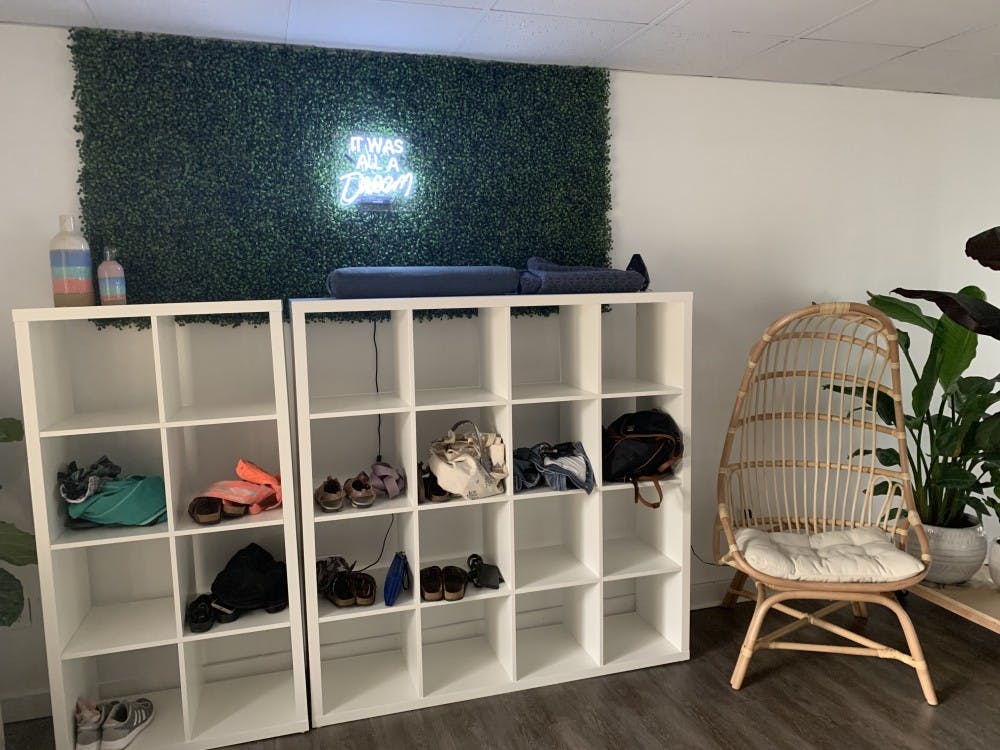
Students leave their belongings in a shelf under a sign that reads, ""It was all a dream."
Taken by Art Schupbach
Cabansag: Why is it called “Zion Well”?
Schupbach: Good question! We love talking about this! So “zion” to us is any place, whether it be a physical place or a place within, that you can find peace.
Cabansag: As far as I can tell, the studio certainly lives up to its name. Zion Well is tucked away in the second floor of a larger complex of small businesses off of Grove Street but as soon as I step inside, I almost forget I’m even in Ypsi. The brightly lit front of the house is minimal. There’s a couch, a bench, a neatly displayed wall of merchandise and a small check-in table. A door by the table leads to the studio. It’s a wide open space with a wood floor. Like she said, there are blankets, blocks and cushions stacked in the corner by a wall of cubbies. A white neon sign that hangs against a leafy backdrop on the wall reads, “It was all a dream.” Two large windows make up almost the entire west-facing wall. Outside, because of the building design, all you can see is the lake.
Do you guys kind of keep the windows open when class is in here?
Schupbach: Yeah, we definitely keep them open. Right now they’re just closed a little bit just because of the draft that’s coming through. We kind of have to winterize the windows. But usually they’re always open because people love to look out there.
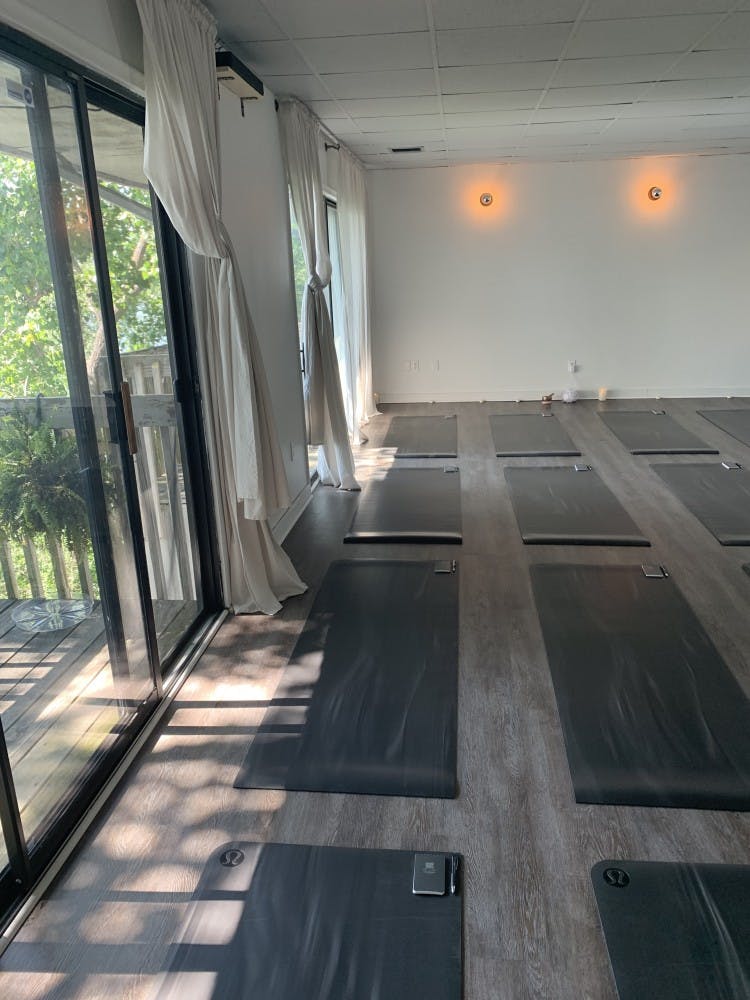
Two large windows allow students to practice yoga in the sun.
Taken by Art Schupbach
Cabansag: Is it the same reason with the plants as well?
Schupbach: Yeah, yeah. So many health benefits to plants, just like being in nature and they omit oxygen for us so that then we can help breathe. And they’re also just very calming and great to look at, especially in the wintertime when things are dark and gloomy.
Cabansag: Yeah!
Schupbach: And snow’s everywhere. It’s gonna be really great to be able to have these living plants inside with us.
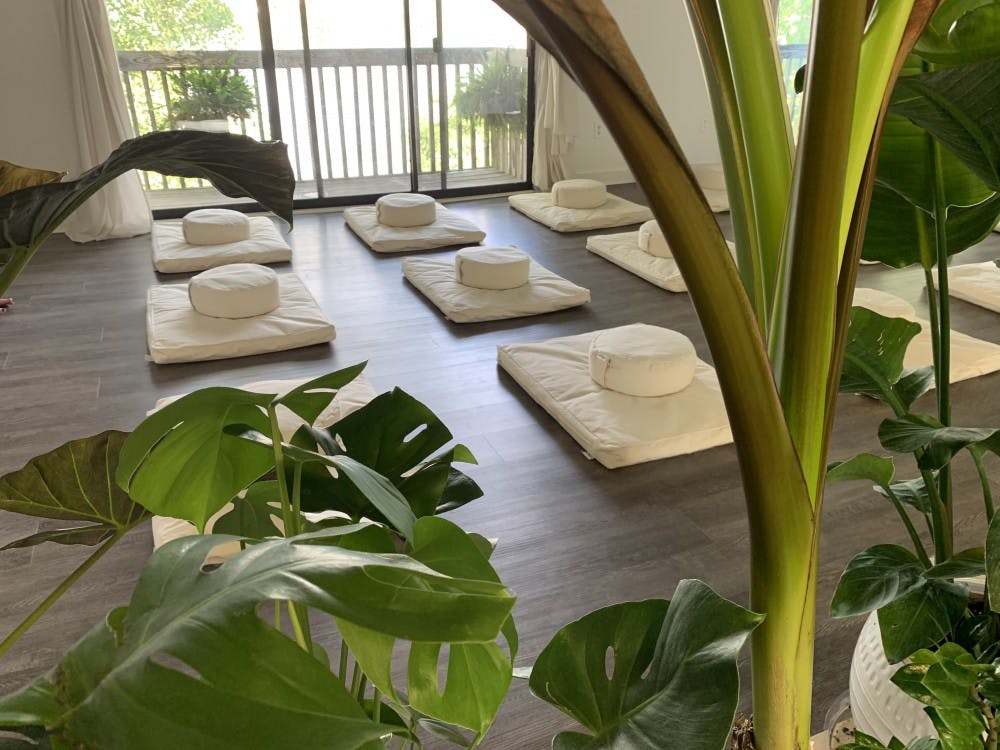
Plants bring color and life to the Zion Well studio.
Taken by Art Schupbach
Cabansag: How many people typically come in here for a class?
Schupbach: It kind of ranges on the class but we have anywhere from, I would say, five to twenty people that come into classes. And we do different workshops and events that are for mental health and wellbeing and physical health as well. We really try to give the community tools that they can incorporate easily into their daily life to support with staying calm and release any sort of anxiety, or when our tension is constantly in our heads and moving all around how we can focus back in the present moment and just continue to be resilient with everything that’s thrown at us.
Cabansag: Zion Well was just opened on June first of this year but Aubrey and her husband Art have both been teaching yoga and meditation for several years. Aubrey was a cheerleader and an athlete growing up and practicing yoga had always been a way of maintaining her flexibility. But later in life, when she and Art moved to North Carolina, away from family, yoga and meditation helped her escape a negative headspace and find herself.
Schupbach: I was just instantly drawn to it and it started to strip away some of the need to always be competitive or physical or things like that. While the poses are always important, and they help unlock different thoughts and emotions, it’s really kind of the thoughts in the head that you start to tune into and you can figure out how you want to work with or change them or have different perspectives, or release certain thoughts that aren’t even yours that kind of happen. Or even distance yourself from them. Since then, I have always - I completely fell in love with it. I did my teacher training there at Wilmington Yoga Center and then I started teaching right after and I knew I wanted to give these tools back to people to give them what I have retained and learned myself. Ways to help people feel calm, release any sort of trauma or preexisting thoughts, ideas. Kind of help them become their own identity in a sense, especially after you transition out of sports and that competitive lifestyle and always needing to be seen or you’re always on performance. You go through a phase of - you’re not quite sure who you are, in a sense, when all of that is gone. So yoga really supported me in finding and building that identity for myself.
Cabansag: Zion Well is a passion project and physical and mental wellness continues to be the focus of their work.
Schupbach: We knew that we always wanted to start this space and to really form it around mental health and tools and tools for addiction, for anxiety, depression, just regaining attention and connection with human beings, which we lose a lot with technology and things like that. And we really wanted to continue to teach about the mind-body connection. Then, we finally found this space and water, like I said, has always been really important to our lives and our own healing and then we just decided to make the jump.
Cabansag: So say I’ve never done any meditation before, I register, I come in for a class. What can I kind of expect as soon as I walk in the door and then throughout the class?
Schupbach: You can definitely expect a warm and inviting experience as soon as you come in. We always remember our first experience going into a yoga studio and how nervous and excited and maybe a little bit timid or scared that you might be as you come in, so we really try to make it inclusive and inviting and just really comfortable for people and let them know where they can put things, what they’ll need on the floor, any questions or feedback. To always just let us know, because that’s how we continue to serve each other. And then, after you get your belongings put away and kind of sit down in class, we always begin with just a simple dialogue of figuring out, “Hey, what’s going on physically that maybe we want to work through a little bit today or kind of incorporate in our practice?” And if it’s really tight hips or really tight shoulders, we might guide the practice around those areas of the physical body in order to release tension and stress. In the meditation and the yoga practice, we guide you through the whole thing so that, one, you’re never alone. A lot of times, people come to yoga to stop thinking and kind of be told a little bit what to do so that they can get out of their head. And so what’s really important to us is to be the guide for them in giving them the opportunity to explore and to feel what works with their body and what resonates. We always also invite them to be in choice and to remember that you can stop any of the practice at any time, you can lie down, you can omit or change the sequence to what your physical body needs. In any breathing exercise, we always guide through it. We let them know the health benefits that will resonate with the body and any physical benefits as well. Like I said, just really give them the choice of what they want to take in. If somebody wants to come in and just lie on the mat and be in the heated room, that’s totally okay with us. I love that, because that means that you’re honoring yourself.
Cabansag: I saw that you’re also hosting “Mindful Resilience” event on campus on Monday. Can you tell me about what students can expect there?
Schupbach: So students can expect a lot of these tools that we teach inside of our studio, but in a controlled environment, that are geared toward student life. So tools to help with any nervousness, anxiety, tools that you can use before taking tests or having to do public speaking, a lot of breath work tools. We’ll also be incorporating a bit of writing and interpersonal skills. And then we’ll also do a little bit of movement with the physical body and then we’ll incorporate some of our relax and body scan and breathing techniques to really help calm students. And just make them really with ourselves, so that they can, in turn, continue to connect with other people and keep achieving all that they want to achieve. And, like I said, a lot of time, if something happens, we’re always constantly in that fight or flight or that stress. We can’t really move forward and we can’t keep doing the things that we need to do in the way that we want to do them. So utilizing some of those tools to help let go of distractions or thoughts that come in our head or fears, so that then we can continue to be resilient and keep moving forward.
Cabansag: The Mindful Resilience event that Zion Well is hosting will take place on Monday, October 21st in room 352 of the Student Center from 5:30 pm to 7:30 pm. The event is free and no registration is required. More information about Zion Well can be found on their website at zionwell.com and video of Aubrey showing me around the studio is available on our website at easternecho.com/section/podcast.
That marks the end of part one of our student wellness series. There’s a lot of effective and convenient mental wellness resources available to students but it’s up to you to take advantage of them, so we hope you take advantage of some of the opportunities we’ve shared with you today. Be sure to check back in for part two of our wellness series, where we’ll be sharing some tips regarding physical wellness. From the Echo Podcast team, don’t forget to breathe today and we’ll see you next week. This is Ronia-Isabel Cabansag, signing off.
The Eastern Echo Podcast is co-directed by Ronia-Isabel Cabansag and Arica Frisbey and produced by Rylee Barnsdale. This episode was written by Ronia-Isabel Cabansag.

